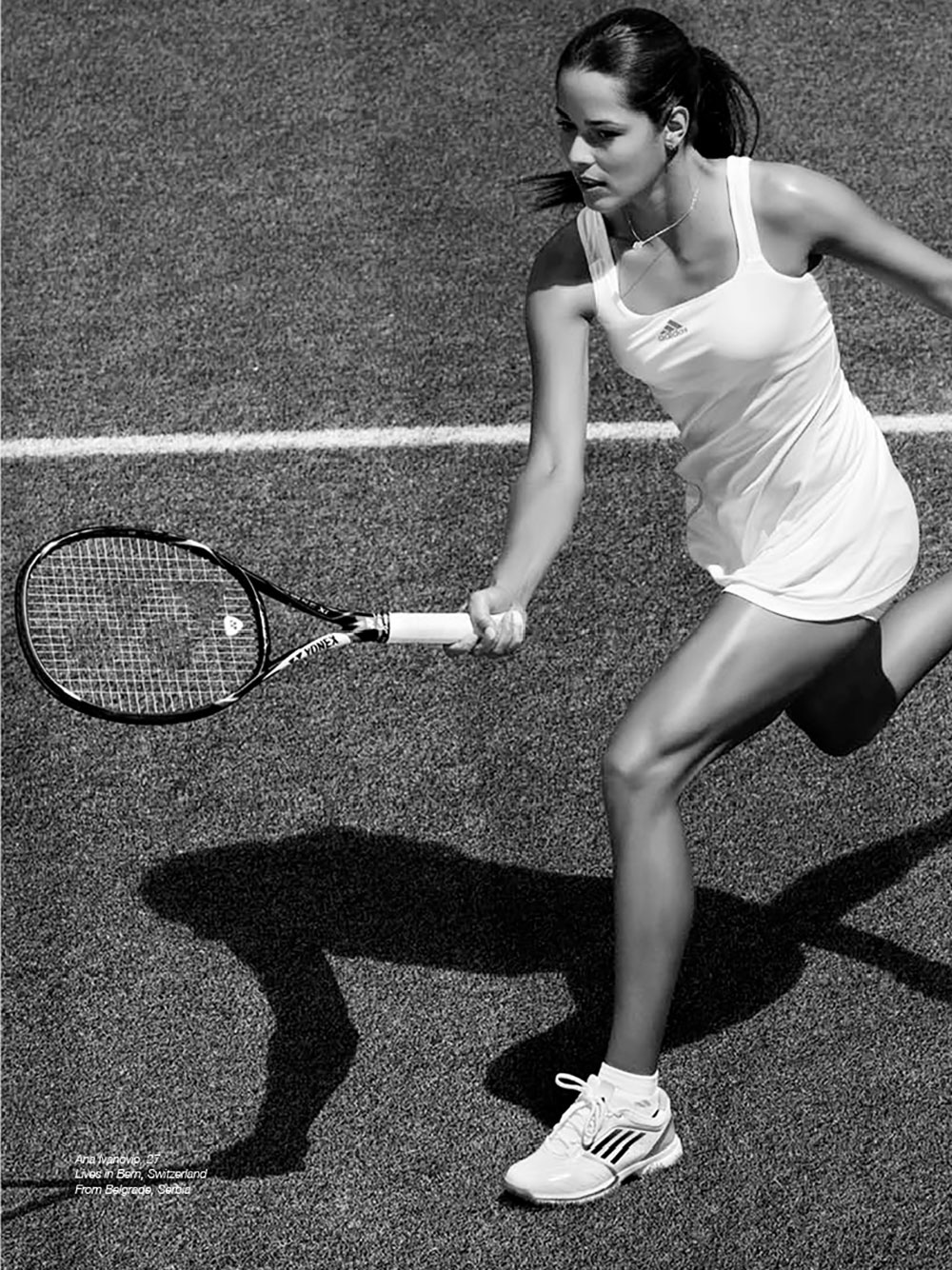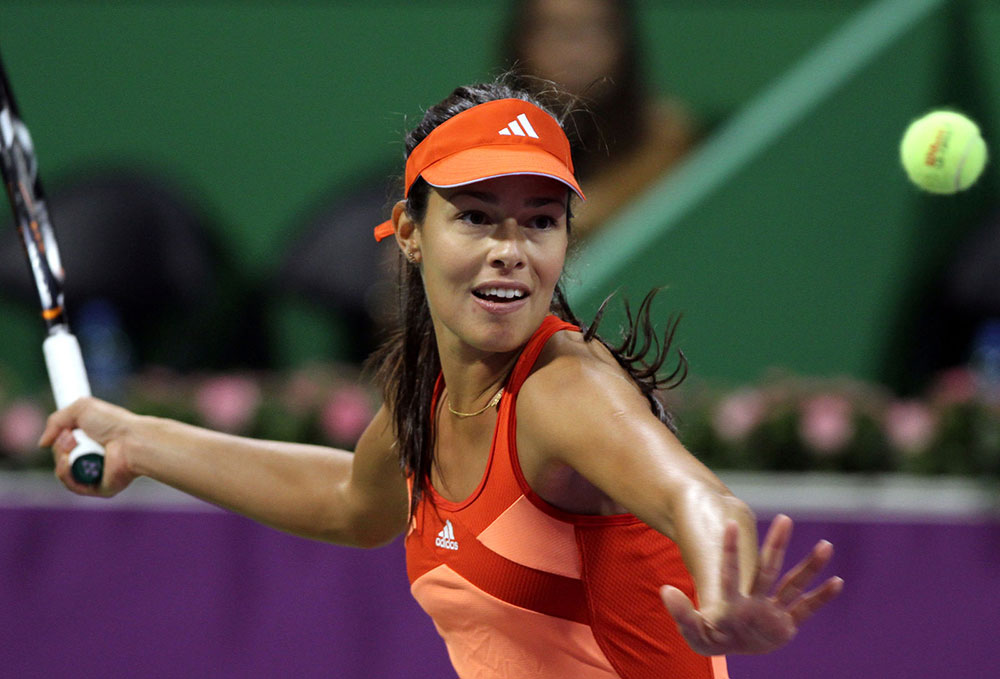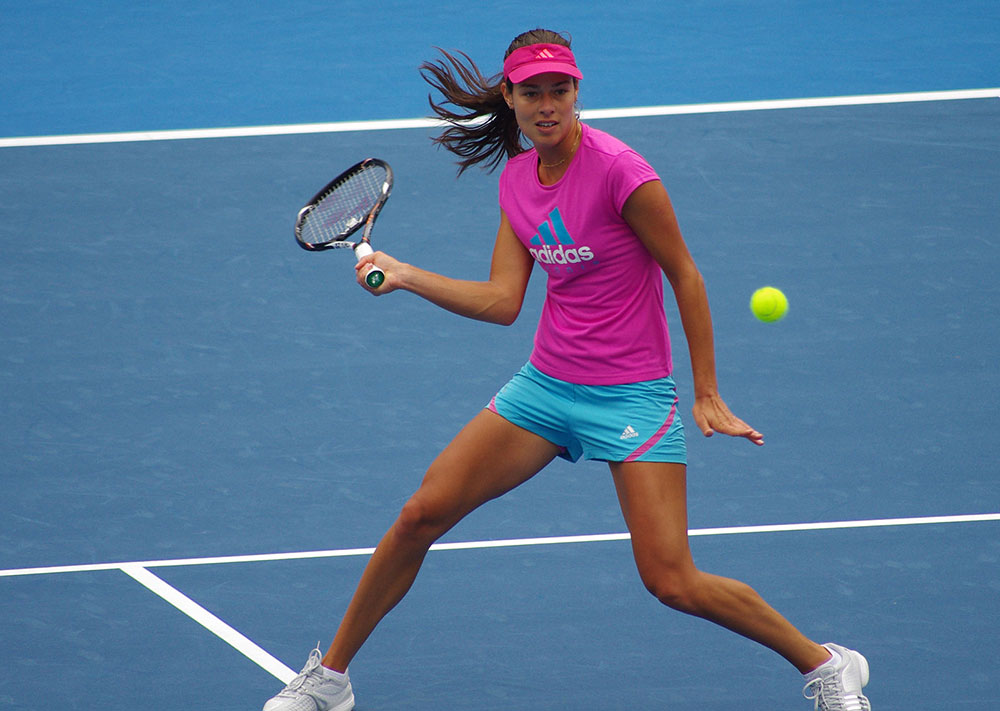“I was at home in Belgrade watching a match with Monica Seles, who was a big hero in Yugoslavia at the time. During the commercial break they showed an ad for a tennis school. It looked like so much fun. I remembered the telephone number, then wrote it down for my mum, and kept asking her to take me. Eventually, after maybe a month of me asking, I had my first tennis lesson. I really fell in love with the game immediately…For my fifth birthday my father gave me my first racket – that was one of the happiest moments of my life. I still have that racket at home, somewhere in the cupboard…” -Ana Ivanovic
And thus a star was born. Decades later, Serbian tennis star Ana Ivanovic is one of the top players in the world. She is currently ranked No. 6, and previously reached No. 1 after beating Dinara Safina to win the French Open in 2008. “Winning the French Open and becoming No. 1 in the world back in 2008 is definitely the highlight of my career so far. Achieving those two goals is something I dreamed of since I was a kid, and it’s something that I will always look back on with great pride and enjoyment.”
As a role model for female athletes, Ivanovic speaks to tennis’s surprisingly progressive gender politics, compared to other professional sports. “I feel that tennis is the leading sport for women and it has been for a long time, certainly since before I joined the tour,” she observes. “But during my professional career we have seen equal prize money awarded at the French Open and Wimbledon. These two events were huge for us and they really broke down the final barriers for women in tennis. The men’s game is in a great moment, with three all-time greats in Federer, Nadal and Djokovic, but women’s tennis is holding its own too: we’ve had some great slam finals in the past couple of years, for example, and Serena Williams is definitely one of the greatest female sportswomen in history”.
When she’s outside the court, she takes classes in finance and Spanish at a University in Belgrade. She has also been a UNICEF National Ambassador for Serbia since 2007, focusing her role there on education and child protection. This aspect of her career is of choice importance to her, and is something that she finds comes very naturally. “Obviously by their very nature children are vulnerable and innocent, so they need us adults, to do all we can to protect them and ensure that they are happy and safe. I have a natural bond with children – I love spending time with them – so it was a natural choice for me, to be involved in children’s’ causes.”
When asked how she sees her future unfolding, Ivanovic says she will continue swinging her tennis racket, of course, as well as hone her skills as a businesswoman. “Hopefully a lot of success on the court! And off the court, I am excited to be taking part in my first beauty campaign: I have partnered with Shiseido, the luxury cosmetic company”. And while she believes there’s nothing wrong with looking nice, Ivanovic is first and foremost an athlete. “On a serious note, I think that anyone who is in the public eye is under more pressure to look good. The media and press can be relentless, especially with the women. Personally, while I take pride in my appearances, when I am on court it is all about my game.”
Read The Untitled Magazine’s full interview with Ana Ivanovic below and don’t forget to grab a print edition of the #GirlPower issue on stands now!
Indira Cesarine: You’ve had an incredible journey as a tennis player – what would you consider to be the highlights of your career so far?
Ana Ivanovic: You’re right; it has been an amazing journey. Winning the French Open and becoming No.1 in the world, back in 2008, is definitely the highlight of my career so far. Achieving those two goals is something I dreamed of since I was a kid, and it’s something that I will always look back on with great pride and enjoyment.
IC: How did you become interested in tennis?
AI: I was at home in Belgrade watching TV. It was a match with Monica Seles, who was a big hero in Yugoslavia at the time. During the commercial break they showed an advert for a tennis school. It looked like so much fun. I remembered the telephone number, then wrote it down for my mum, and kept asking her to take me. Eventually, after maybe a month of me asking, I had my first tennis lesson. I really fell in love with the game immediately. For my fifth birthday my father gave me my first racket – that was one of the happiest moments of my life. I still have that racket at home, somewhere in the cupboard.
IC: You must have a very rigorous training schedule – can you tell us what the average day is like for you?
AI: It’s hard to describe an “average” day because they are so different, depending on whether I’m playing a tournament, preparing for one, or in a training block. Basically, the closer I am to a tournament, the more focus there will be on tennis, whereas during a training block we will work a lot on my fitness, both strength and overall conditioning. During a training block I will usually have a gym session in the morning, followed by a 90-minute hit. Then in the afternoon I will have either another gym session or another tennis session, so that’s three sessions in total. I work on many things in the gym, including strength using traditional weights machines, but also my footwork and movement: lateral running, stopping and starting, balance, this kind of thing. It’s quite intense so the recovery part, in the evening, is also very important: I will have a massage and usually an ice bath too, then dinner with my team.
IC: What do you have to put in to your daily training?
AI: It takes some mental strength as well as physical. For us tennis players, we obviously don’t have an office: our natural environment is the gym or the court. Just as you can’t skip a day at the office, we mustn’t miss a training session, and of course there are rare occasions when you are not really in the mood for it, and that’s when the discipline is required.
IC: You’ve been a professional athlete since 2003. Over the past decade have you noticed any positive change in the way women athletes are perceived?
AI: That’s a great question. Overall I would say yes. I feel that women’s tennis is the leading sport for women and it has been for a long time, certainly since before I joined the tour. But during my professional career we have seen equal prize money awarded at the French Open and Wimbledon. These two events were huge for us and they really broke down the final barriers for women in tennis. The men’s game is in a great moment, with three of the all-time greats in Federer, Nadal and Djokovic, but women’s tennis is holding its own too: we’ve had some great slam finals in the past couple of years, for example, and Serena Williams is definitely one of the greatest female sportswomen in history.
IC: Although you came out back on top – 2013 was a difficult year for you. What did this period, followed by your impressive come back in 2014, teach you about yourself and the industry?
AI: Thanks. It’s true that I had some very difficult years in my career, and it really taught me a lot, both about myself and the tennis world in general. It also showed me who my true friends were: there are some people you only hear from when you’re successful, whereas your truest friends support you no matter what. Fortunately the vast majority of my friends in tennis never stopped supporting me, and they continued to treat my very nicely no matter whether I was winning or losing.
IC: How did you begin working with UNICEF?
AI: I was invited to become a National Ambassador for Serbia in 2007, I think it was. It was a huge honor for me – one of the biggest of my career, because it’s an amazing responsibility, to be asked to serve as a role model like this. Since then I have taken part in many events with UNICEF in Serbia: when I am in Belgrade I always try to visit schools and take part in workshops to raise awareness about bullying: I am focused on the School Without Violence awareness program.
IC: What makes education and child protection, a cause you’ve spoken out for, especially important to you?
AI: Obviously by their very nature children are vulnerable and innocent, so they need us adults to do all we can to protect them and ensure that they are happy and safe. I have a natural bond with children – I love spending time with them – so it was a natural choice for me, to be involved in children’s causes.
IC: You have a lot of fans that see you as a sex symbol. How do you feel about that?
AI: It’s very flattering but I don’t take it too seriously. I think that at the end of the day I am known for my tennis. Anything that gets more people watching tennis is good for the sport.

IC: This is our “Girl Power” issue, which revolves around themes of female empowerment. Do you consider yourself a feminist? If so what does that mean to you?
AI: Yes, I guess I would consider myself as a feminist. Perhaps not an active one, but I definitely stand for girl power and support women rights. I believe that we should all have the same rights and be able to achieve whatever we set ourselves to, despite gender differences.
IC: What are a few of the challenges you face as a female athlete, and what do you do to overcome them?
AI: I am aware that there is a little bit of chauvinism among some male players: we’ve seen it in the press over the years. There are some male players who will never watch women’s tennis, and that’s fine – I am sure that plenty of women have no interest in men’s tennis either. Overall, I am pleased to say that I really don’t feel like I face any special challenges because of my gender: there are one or two tournaments that don’t seem to treat the women as well as the men, but these are very much the exceptions and overall we are treated very well.
IC: There is a lot of tension in the gender equality movement in regards to women in sports, because physically, women are different from men, and that’s an area where they are still segregated. What do you think of that?
AI: I’m not really sure there is “segregation.” Women these days, at least in my world, are respected for their strength and other physical attributes, and it seems to be the case in everyday life too: when I go into public gyms I see men and women working out alongside each other. Men are generally stronger and fitter than women: that’s a fact of science, and I think most people understand that.
IC: Do you feel female athletes are under more pressure to appear attractive than their male counter parts?
AI: Yes, I think that’s true. We often get judged by our appearances and the way we come across, and actually the skirts are getting shorter and shorter [laughs]. On a serious note, I think that anyone who is in the public eye is under more pressure to look good. The media and press can be relentless, especially with the women. Personally, while I take pride in my appearances, when I am on court it is all about my game.
IC: In past interviews you’ve described yourself as “sensitive.” Have you had to develop a thick skin in world of sports?
AI: Yes, in some ways I have. It’s important not to pay too much attention to criticism, be it positive or negative. I actually try not to read about myself. It would be too much, if I was following all the stories and discussion about my career. I think it’s important to be your own person and not care too much about what others think. Even though I’ve never followed my own press, earlier in my career I probably cared a little bit too much about what other people thought, and I tried to please them. Now I feel I am more at ease with myself, so it’s not something that concerns me.
IC: How are you able to integrate and maintain your feminine side into your career as an athlete?
AI: To be honest, I don’t have to try to integrate my feminine side into my career. I am a woman and an athlete and I don’t feel that I need to choose one or the other.
IC: In addition to tennis, you also study finance, what are your goals for the future?
AI: Taking into a consideration the fact that my tennis schedule is still so intense and I am on the road most of the year, I had to pause my finance studies. Having said that, I definitely want to finish my degree when I am able commit to my studies properly. At present tennis is still my priority, but I am excited to be challenged intellectually again. Another area that interests me a lot is psychology.
IC: What do we have to look out for you in 2015? Can you tell us about any forthcoming events or matches you are especially looking forward to?
AI: Hopefully a lot of success on the court! And off the court, I am excited to be taking part in my first beauty campaign: I have partnered with Shiseido, the luxury cosmetic company.
This article originally appeared in The #GirlPower Issue of The Untitled Magazine (2015).





